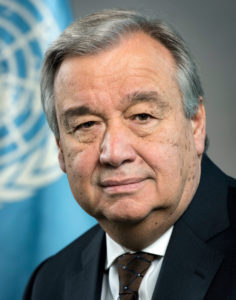Statements

Statements
Message from UN Secretary-General
On this World Telecommunication and Information Society Day, we focus on digital technologies for older people and healthy ageing.
From building smarter cities to combatting age-based discrimination at the workplace, ensuring financial inclusion, safeguarding independence, and supporting millions of caregivers across the world – information technology has vast potential to improve the lives of older people and their families and communities.
But to make the most of the opportunities presented by 5G, artificial intelligence, the Internet of Things, digital health, and other technologies, we must dramatically improve accessibility and inclusivity.

Nearly half of humanity still has no access to the internet. We must connect everyone, everywhere by 2030 — because leaving no one behind means leaving no one offline. At the same time, we must take action to prevent and reduce the dangers of information technology, including the spread of misinformation and the exploitation of personal data.
This is the vision of my Roadmap for Digital Co-operation — to embrace the promise of digital technology while protecting people from its perils.
I commend the International Telecommunication Union for its vital work narrowing the digital divide, setting standards, and connecting people wherever they are, whatever their means.
On World Telecommunication and Information Society Day, let us commit to working together to ensure that technology is equitable, safe, and affordable for all people and all ages.
Message from ITU Secretary-General, Houlin Zhao
Humanity and technology are at a turning point. During the pandemic, the world has seen what digital technologies can do and how they can transform our future.
Emerging digital technologies in fields from 5G and the Internet of Things to AI and cloud computing are pushing the boundaries of what’s possible. Like other breakthrough technologies before them, they will have a profound impact on our future and that of our planet.
Great possibilities come with great responsibilities. Close to 3 billion people are still unconnected, with the majority of them living in developing countries—especially in rural areas. Gender, generational and affordability gaps also remain.
Equitable access to digital technologies isn’t just a moral responsibility, it’s essential for global prosperity and sustainability. This includes the more than 1 billion people aged 60 years or older at the center of this year’s celebrations of World Telecommunication and Information Society Day.
This group of the population, which is growing larger and larger, has greatly contributed to the social and economic achievements of our time. With time passing, they are now facing new opportunities and challenges. They deserve our care and help.
Observed on 17 May, WTISD marks the founding of ITU. We are focusing our efforts this year on “Digital Technologies for Older Persons and Healthy Ageing” as part of ITU’s ongoing efforts to support the Decade of Healthy Ageing launched by the World Health Organization and the United Nations.
I’m calling on you to share with us what has worked and what else can be done to help older persons become active participants in, and valuable contributors to, the digital world.
With WTSA, WTDC and PP-22 all taking place this year, 2022 represents an unprecedented opportunity to break cycles of exclusion and accelerate digital transformation for all.
Let’s make this year count. Let’s do it for the sake of humanity and the sake of the world.
Message from Dr Tedros Adhanom Ghebreyesus, Director-General of the World Health Organization
World Telecommunication Information Society Day is an opportunity to highlight the huge potential for digital technologies to improve our lives. This year, we’re drawing attention to the many benefits of digital technologies for older persons. These tools can help older people connect with families and friends, stay well informed and maintain their health and well-being. The challenge is to make sure that all older people can access these technologies and they don’t become another reason that some people are left behind. WHO is proud to partner with the ITU to realize the power of technology for healthy aging and a healthier world.